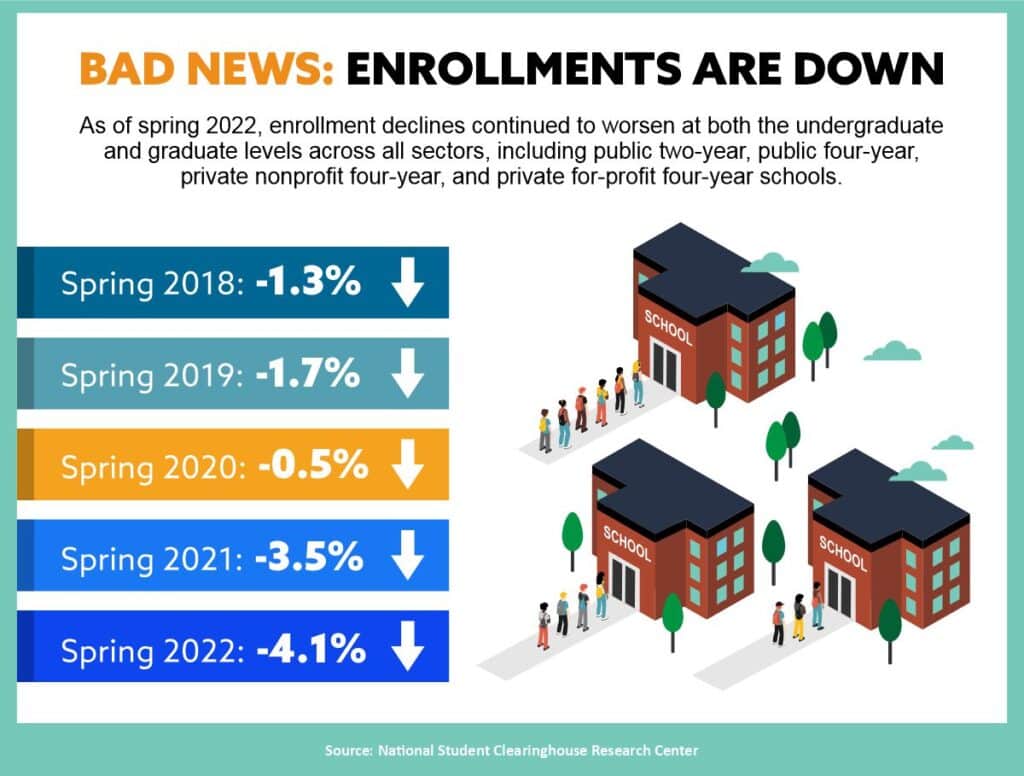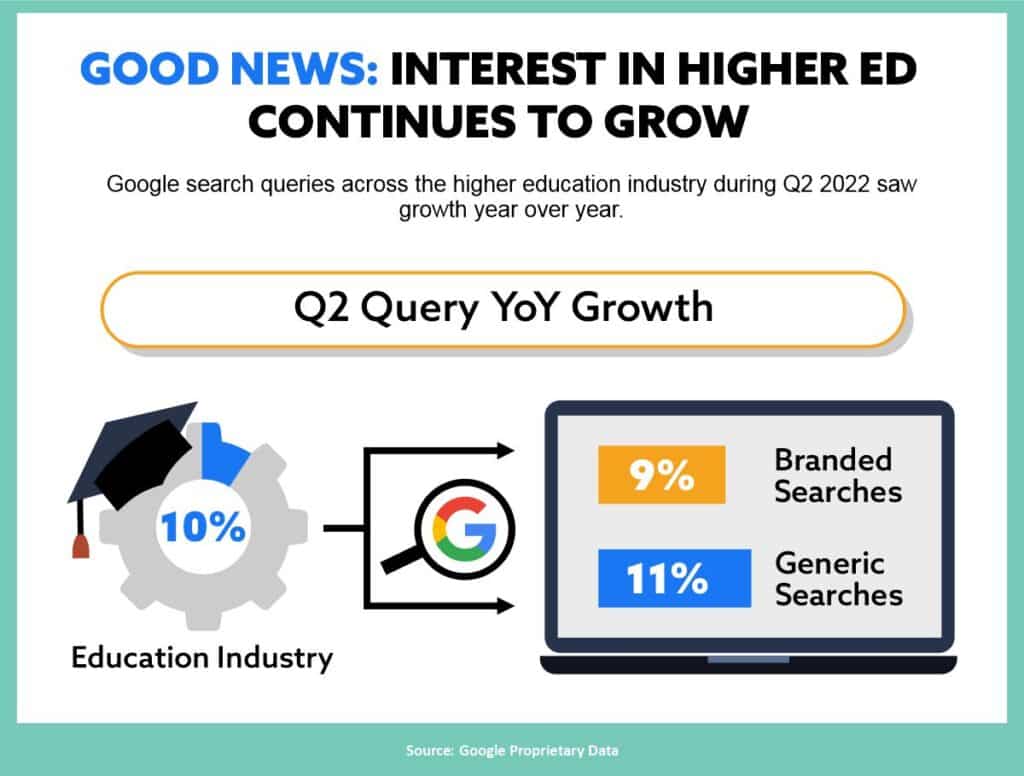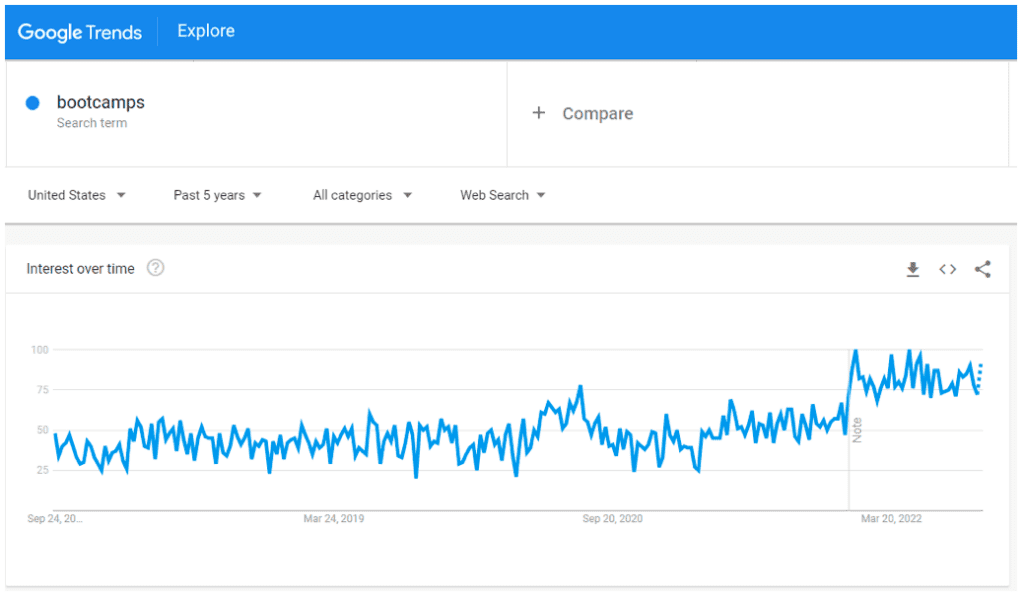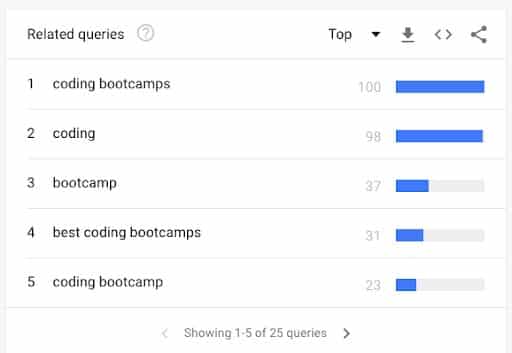How to Use Search Terms to Boost Alternative Education Programs
The only constant society has experienced in the last couple of years is change. Education? Changing. Workplaces? Changing. Our culture as a whole? Changing.
With all these shifts, there’s good news and bad news for the higher education market. The Bad News: Enrollments are dropping. According to the National Student Clearinghouse Research Center, total higher-ed enrollments fell to 16.2 million this spring, a 4.1% decline from last year. Unfortunately, the decline is likely to continue as the looming “demographic cliff” approaches.

The Good News: Recent Google search trends in higher education reveal that overall interest continues to grow. While search volume for traditional degrees is expanding, recent search trends point to an even greater interest in alternative education programs like bootcamps, certificate programs, and short courses.

Prospective students are reeling from the effects of rising college costs, a devastating and lingering pandemic, and a rapidly evolving workplace. To their credit, they’re responding like savvy consumers when it comes to spending precious dollars on education by prioritizing the return on their investments.
What can higher-ed institutions do to connect with today’s students? One proven strategy is to follow the search trends data and use ROI-based messaging to promote program value.
Why Alternative Education Programs Are Trending in Search
Paying for a traditional degree today is slowly becoming less attractive to prospective students who have the opportunity to take courses for a shorter amount of time, at a lower cost, while still remaining competitive with those who choose a traditional degree path.
In short, prospective students are beginning to recognize a simpler, less expensive way forward through alternative education programs, and many employers are following suit. Nearly half of Apple’s employees, for example, do not hold traditional degrees. Businesses are looking for competent employees with specific skills, not necessarily a diploma.
Recent search results confirm that bootcamps, certificates, and online short courses have garnered some serious traction. It’s worth understanding why this matters and what it means for higher education.
Google Insights on Higher-Ed Search Trends
Proprietary Google search trends data, shared with Archer Education through Google’s recent Education Insights Quarterly report, confirms that alternative education search terms grew in popularity between Q2 2021 and Q2 2022. Our partnership provides access to Google’s analysis of higher education data, including this report, which measures and analyzes search queries related to higher ed. Our team of experts at Archer Education pulled together some of the most significant findings:
Bootcamps
Although bootcamps make up a relatively small segment of the higher-ed landscape, interest in bootcamps — as measured by year-over-year growth in query volume — grew the most out of the programs mentioned in the Google report (including all traditional degree levels), with an approximate 40% increase YoY. Data pulled from the Google Trends tool supports this shift, showing a spike in queries around bootcamps over the past few years.

It’s also important to note the related terms that come up in Google Trends to help unpack why the popularity is growing — “coding” and “coding bootcamps” appeared in the list of top related search terms. Although the growth in alternative education programs can’t be attributed solely to coding, the rising interest (and success) with these programs has opened the door for institutions to consider bootcamp-style learning opportunities.

Certificates
Certificates captured the largest share of query volume in Q2 out of the programs mentioned in the Google report. This doesn’t come as much of a surprise, as people are looking to level up in their careers and find savvy ways to become more qualified for the positions they’re in — or hope to eventually pursue. It’s especially relevant when we consider the rise of nontraditional learners and a whole new set of adults who are open to higher education now that they know there are more affordable, accessible options out there for them.
Online Short Courses
Growth of online short courses has exploded over the past two years, with a huge addressable audience. In fact, the number of students enrolling in these courses has increased by 83% since 2019, according to another proprietary report shared with us by Google, the Student Insights July 2022 report. Furthermore, as technology continues to dominate the world in one way or another, it’s no surprise that tech and business make up a large portion of the subject matter for these courses. Students enrolling in these kinds of courses are looking to advance their careers by developing transferable skills and building credits toward a certificate or degree.
Online Degrees
Online degree programs have been considered “alternative” in the past, but with today’s digital landscape, they’re quickly becoming the norm. Growth in the past 10 years has been steady, but the pandemic expedited the process, as massive open online courses reached around 20 million students by 2021.
How to Incorporate the Latest Search Trends Data
Most of this information likely isn’t a shock to higher-ed executives and marketing professionals. The pandemic forced institutions to take a look at their offerings and recognize the opportunity that a lot of these certifications, bootcamps, and other online programs present. Still, many colleges and universities are falling behind or failing to recognize what students are actually searching for.
If you’re looking to up your institution’s higher-ed marketing game, you can use this information to improve your enrollment approach in the following ways.
Launch New Programs
The search volume is there. Prospective students are seeking out alternative education programs, and if you want to win, you need to show up in these categories. If your institution doesn’t have the funds or infrastructure to develop a program on its own, consider collaborating with a partner and share your brand with some household names launching alternative education programs.
Emphasize Existing Programs
If your institution has existing alternative education programs, emphasizing these options in your marketing campaigns is important. While it’s essential to keep advertising traditional pathways, you also want to elevate the unique programs that may better suit some prospective students. Consider the share of interest here and be sure that it’s mirrored in your marketing efforts. Put more resources behind getting your alternative education programs in front of prospective students.
Optimize Your Messaging Strategy
While both launching new programs and highlighting current ones make sense, we at Archer Education also recognize that not everyone is working with million-dollar budgets to supplement these suggestions. With that, there are two things you absolutely should be doing. One is to update your SEO strategy with high-volume search terms in mind. Organic channels are owned and should be nurtured at all times. With trending keyword insights, you should be able to optimize your digital marketing strategy and begin reaching the nontraditional students who are making up a huge portion of the market.
When it comes to where limited marketing dollars are going, we recommend using these terms to inform your strategies. The cost per click has gone up with demand for these terms, but you can stand out with ROI-based messaging. Prospective students want to clearly understand what they’ll get out of investing in their education right off the bat. Get their attention creatively and then ensure your messages are clearly and concisely conveying the benefits of enrolling in your program.
Consider Insight From a Trusted Partner
As the VP of digital marketing at Archer, I live and breathe higher-ed trends data and am constantly collecting insights around search volume and connected strategies. Although I’m relieved to see the search volume continue to grow, I do want to call out the hesitancy I’m seeing around actually enrolling.
This is where ROI-based messaging comes in. People appear to be a lot more cautious about where their money is spent and want to ensure the programs they enroll in will bring genuine value to their lives. It’s important to put people at ease and help them recognize how your alternative education programs can positively impact their future. At Archer, we’re constantly evaluating a variety of approaches to find value in areas where brands can set themselves apart. We focus more on the insight-driven creative components, evaluating how messaging is structured or used to tell a story that will resonate with prospective students.
Use Google Search Trends to Your Advantage
The higher education industry has a unique opportunity to shift its focus and meet the needs of a new kind of student. Recent search trends provide key insights around what kinds of content prospective students are engaging with. Whether you’re brand-new to alternative education programs or starting to implement some variation of them, it’s important to listen closely to the trends that Google search term analysis can provide. Our team of marketing experts at Archer Education is consistently maintaining organic and promoted growth for client institutions, and in doing so, it has developed a deep understanding of the digital search landscape. We partner with accredited universities to help higher-ed leaders and marketers accelerate online learning growth and enrollment. If you’d like to learn more, contact our team and explore our offerings today.



